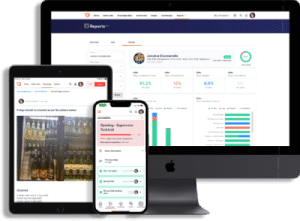Food Safety Changes Australia: Stay Safe with the Updated Food Standards in Australia!
On December 8, 2022, Food Standards Australia New Zealand (FSANZ) announced an update to Safe Food Australia, incorporating the new Standard 3.2.2A, which all businesses need to meet from December 8, 2023.
Stay updated on the latest food safety requirements in Australia. This update is a significant step in enhancing food safety within the food service and retail sector, benefiting consumers and ensuring public health and safety. These changes include the following:
- Each business must have a Food Safety Supervisor.
- Businesses must ensure their food handlers have appropriate training.
- Businesses that do ‘prescribed activities’ must keep Food Safety Records for those activities.
The collaboration between federal, state, and territory governments in this endeavour aims to maintain high consumer confidence in the safety practices of the food service and retail sector, which plays a pivotal role in both the Australian way of life and the nation’s economy.
In this article, we’ll discuss how you can ensure that your food business is compliant with these standards.

What is the food safety plan in Australia?
The food safety plan in Australia is a comprehensive framework that outlines procedures and measures to ensure the safe handling, preparation, and distribution of food products, reducing the risk of foodborne illnesses.
What are the Australian food safety standard changes by state?
The implementation of the updated food safety standards in Australia may vary from state to state, as each state and territory often has its own regulatory and enforcement mechanisms.
We’ve covered the changes per state below, but you can also find more information at their respective State Government websites:
Australian Capital Territory
- All businesses have required a food safety advisor in the ACT since 2013, meaning that this new amendment will have no effect on already compliant businesses.
- While all businesses should provide food handlers with adequate training already, they will have a legal obligation on December 8 onward, enforced by environmental health officers.
- Businesses are required to keep records of prescribed activities and keep them for at least 3 months.Prescribed activities are those that involve handling potentially hazardous, ready-to-eat food. These records can be kept in many forms, such as written, electronic, photos, videos, notes on a receipt and temperature data logs.
New South Wales
From December 8; food service, catering and related retail businesses that process unpackaged, potentially hazardous food, and serve it ready-to-eat in New South Wales are required to:
- Have a qualified onsite Food Safety Supervisor, who is reasonably available to supervise food handlers (this is already a requirement for some of these of businesses)
- Ensure all food handlers are trained in food safety and hygiene, or can demonstrate adequate skills and knowledge
- Be able to show their food is safe
Northern Territory
Similarly to the other states, NT requires food businesses to have:
- A food safety supervisor that has completed at least one of the following skill sets within the last 5 years:
- SITSS00069 food safety supervision skill set
- SIRRFSA001 handle food safety in a retail environment unit.
- Staff trained in food safety. NT Health recommends the following courses:
- Evidence of compliance with parts of the existing food safety standard, from real time demonstration to records of safety controls, activities and processes
Businesses must meet the standard if they fit into one of the following categories:
- Category 1: food service – such as restaurants, takeaways and caterers
- Category 2: retail – such as delis, supermarkets and butchers.
Queensland
Like with other states, examples of the following kinds of business must meet the requirements outlined :
- Category 1: Restaurants, takeaway outlets, caterers and bakeries
- Category 2: Delicatessens, market stalls, service stations and convenience stores
These requirements are that specified food businesses must have:
- A food safety supervisor that has been certified within the past five years with;
- A food safety supervisor certificate from a registered training organization (RTO) relevant to their food sector for category one and category two food businesses.
- A statement of attainment from an RTO upon successful completion of a training course or demonstrating existing skills, experience, or training that align with national competencies (recognition of prior learning).
- Training for food handlers in the following competencies;
- Safe handling of food
- Food contamination
- Cleaning and sanitising of food premises and equipment; and
- Personal hygiene
- Evidence tools (record keeping) of the following activities;
- Receipt, storage, display and transport (if applicable) of potentially hazardous foods under temperature control
- Adequate processing (e.g. cooking, acidifying, fermenting) of potentially hazardous foods
- Minimisation of the time potentially hazardous foods are out of temperature control during processing
- Cooling of potentially hazardous foods within the specified time and temperature limits
- Reheating of potentially hazardous foods rapidly to the required temperature
- Adequate cleaning and sanitation of food surfaces and equipment.
South Australia
Like other states, South Australia requires food businesses to have the following:
- A qualified Food Safety Supervisor
- Appropriately trained food handlers
- Adequate food safety records
It is the responsibility of businesses to incur the following monetary and time-related costs for the sake of this compliance;
- Providing time for food handlers to complete a food safety training course and/or making sure they have the appropriate skills and knowledge
- Paying for a food handler to complete Food Safety Supervisor certification, or employing a certified Food Safety Supervisor
- Developing and/or providing training on processes, records, or other ways to show that the key food safety controls are monitored and managed
Tasmania
Certain food service, caterer and retail businesses in Tasmania require the following:
- Food handler training
- Food safety supervisor (FSS)
- Substantiation of key food handling practices
For Tasmanian businesses, the key change is the Food Safety Supervisor requirement. The FSS must:
- be trained to recognise and manage food safety risks,
- have completed Food Safety Supervisor training with a Registered Training Organisation in the last 5 years,
- have the authority and ability to advise and supervise other food handlers, and
- work on the premises and be involved in the day-to-day food handling operations of the business.
Victoria
According to the Victorian Government;
- Food businesses must make sure their food handlers have adequate skills and knowledge before they start working with high-risk foods, including the following food safety topics:
- Safe food handling including temperature control measures for potentially hazardous food and the temperature danger zone.
- Food contamination including ways to keep food from becoming contaminated, and food allergen management.
- Cleaning and sanitising food contact surfaces and equipment including correct procedures, using food-grade chemicals, and sanitising using heat.
- Personal hygiene including obligations for sick employees, handwashing, uniforms and grooming of hair, nails, and skin.
- The supervision of food handlers requires businesses to appoint a qualified FSS who is available to oversee the day-to-day food handling operations, help food handlers to handle food safely, and make sure food safety risks are managed.
- However, in Victoria, an exemption will apply for FSSs who received their certification prior to 8 December 2023 and will give them five years from 8 December 2023 to re-certify; that is, they must re-certify by 8 December 2028. For anyone first certifying as an FSS from 8 December 2023 onwards, their qualification is valid for five years.
Western Australia
Businesses are required to meet this standard if they handle food that’s:
- Unpackaged
- Potentially hazardous
- Ready-to-eat
All food handlers must either:
- Have completed a food safety training course
- Be able to demonstrate skills and knowledge in food safety and hygiene relevant to their food handling activities
All businesses must appoint a food safety supervisor that can:
- Identify, prevent and fix food safety problems
- Share their skills and knowledge with food handlers and promote positive food safety practices in the food business
- Supervise food handlers engaging in handling unpackaged PHF and ensures that the correct safe food handling practices are used
- Make sure steps are taken to manage food safety risks
All businesses must show that they are making safe food by either:
- Keeping a record of important food safety controls, activities and processes, or
- Demonstrating safe food handling practices
Operandio can help you digitise and streamline for food safety processes to keep your business 100% safe and compliant. Book a free demo today to see why hundreds of hospitality businesses like yours are signing up.
Try Operandio for free
Get started in less than 2 minutes.
By signing up, you accept the Subscription Agreement and Privacy Policy.
